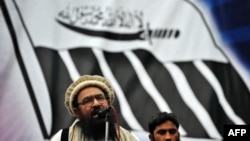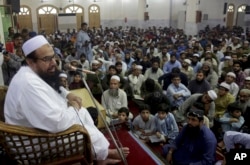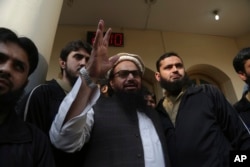VOA Urdu's Ali Rana contributed to this story.
WASHINGTON — Pakistani authorities on Wednesday arrested a senior leader of the Pakistan-based Jamaat-ud-Dawa (JuD) and its affiliated Falah-e-Insaniat (FiF) charity group, which are both U.S.- and U.N.-designated terror organizations.
Abdul Rehman Makki, the Islamist leader, was taken into custody in Punjab province on charges of inciting hatred and using defamatory language against authorities for the recent countrywide crackdown against banned militant organizations.
Makki was reportedly upset over the government's action against religious groups and harshly denounced it in a recent public gathering. He also condemned the Financial Action Task Force (FATF), the global terror watchdog, for putting Pakistan on notice to take measures against terror financing in the country.
During the gathering, he also sought donations from followers for the outlawed JuD terror group.
Militant groups in Pakistan reportedly collect donations under the guise of religion and welfare for the poor, but instead use the money to fund terrorism inside and outside of Pakistan.
Makki is chief of FiF and also monitors JuD's political and international affairs wings. He is believed to be second-in-command after JuD's founder, Hafiz Saeed, who is a U.S.- and U.N.-designated global terrorist.
In 2012, the U.S. Rewards for Justice Program (RFJ), which is sponsored by the U.S. State Department, placed a $2 million bounty on Makki for his alleged terror ties.
'Loud and clear message'
Some experts in Pakistan see Makki's arrest as a big development and call it a message for terror groups in the wake of FATF's growing pressure on the country to take action against terror financing and money laundering.
"This arrest is a message for FATF and international community and a loud and clear message for such organizations operating in Pakistan," Mujahid Hussain, a Pakistan-based political analyst, told VOA.
The Paris-based global terror watchdog placed Pakistan on its gray list last year because of Islamabad's alleged inadequate measures against terror financing and money laundering.
The watchdog is expected to review Pakistan's progress in cracking down on those offenses next month. It is believed that the country might not be able to get off of the list.
"This arrest is an important one as Makki plays an important part for JuD after Hafiz Saeed. He has worked immensely for JuD in the past. JuD's infrastructure was basically formed by Abdul Rehman Makki," Sabookh Syed, a Pakistan-based journalist who follows these developments, told VOA.
Makki is closely related to Saeed, the alleged mastermind of the 2008 Mumbai terror attacks that killed 160 people, including six Americans.
Saeed, himself lives freely in Lahore, despite having a $10 million U.S. bounty on him since 2012.
Crackdown
Pakistan has recently increased its pressure on militant groups operating in the country.
Earlier this week, the government placed 11 organizations on its terror watch list for their alleged ties to JuD and FiF.
Makki was unhappy with the development and criticized the government for its crackdown.
In March, the government went after religious organizations and seized assets of groups placed on the United Nations Security Council's terror watchlist that including JuD and FiF.
The government reportedly took control of properties operated by JuD throughout the country and arrested several of JuD's workers.
Front organization
JuD is believed to be the front organization for Saeed's Lashkar-e-Tayyiba (LeT), a U.S.-designated terror group founded by Saeed in the 1980s with the aim to liberate Indian-administered Kashmir and its eventual merger with Pakistan. Over the years, the group has expanded its operations to Afghanistan.
Pakistan has been under international pressure for its inability to crackdown on Saeed and his JuD and FiF organizations.
Despite being placed on U.S. and U.N. terror lists, the organizations until recently operated freely.







